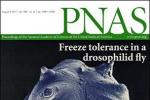Larvae of the fly Chymomyza costata survive in liquid nitrogen
The larva of the drosophilid fly, Chymomyza costata, is the most complex metazoan organism that can survive submergence in liquid nitrogen (-196 °C) in a fully hydrated state. We examined the associations between the physiological and biochemical parameters of differently acclimated larvae and their freeze tolerance. Entering diapause is an essential and sufficient prerequisite for attaining high levels of survival in liquid nitrogen (23% survival to adult stage), although cold acclimation further improves this capacity (62% survival). Profiling of 61 different metabolites identified proline as a prominent compound whose concentration increased from 20 to 147 mM during diapause transition and subsequent cold acclimation. This study provides direct evidence for the essential role of proline in high freeze tolerance. We increased the levels of proline in the larval tissues by feeding larvae proline-augmented diets and found that this simple treatment dramatically improved their freeze tolerance. Cell and tissue survival following exposure to liquid nitrogen was evident in proline-fed nondiapause larvae, and survival to adult stage increased from 0% to 36% in proline-fed diapause-destined larvae. A significant statistical correlation was found between the whole-body concentration of proline, either natural or artificial, and survival to the adult stage in liquid nitrogen for diapause larvae. Differential scanning calorimetry analysis suggested that high proline levels, in combination with a relatively low content of osmotically active water and freeze dehydration, increased the propensity of the body solutions to undergo a glass-like transition (vitrification) and thus facilitated the prevention of cryoinjury.














